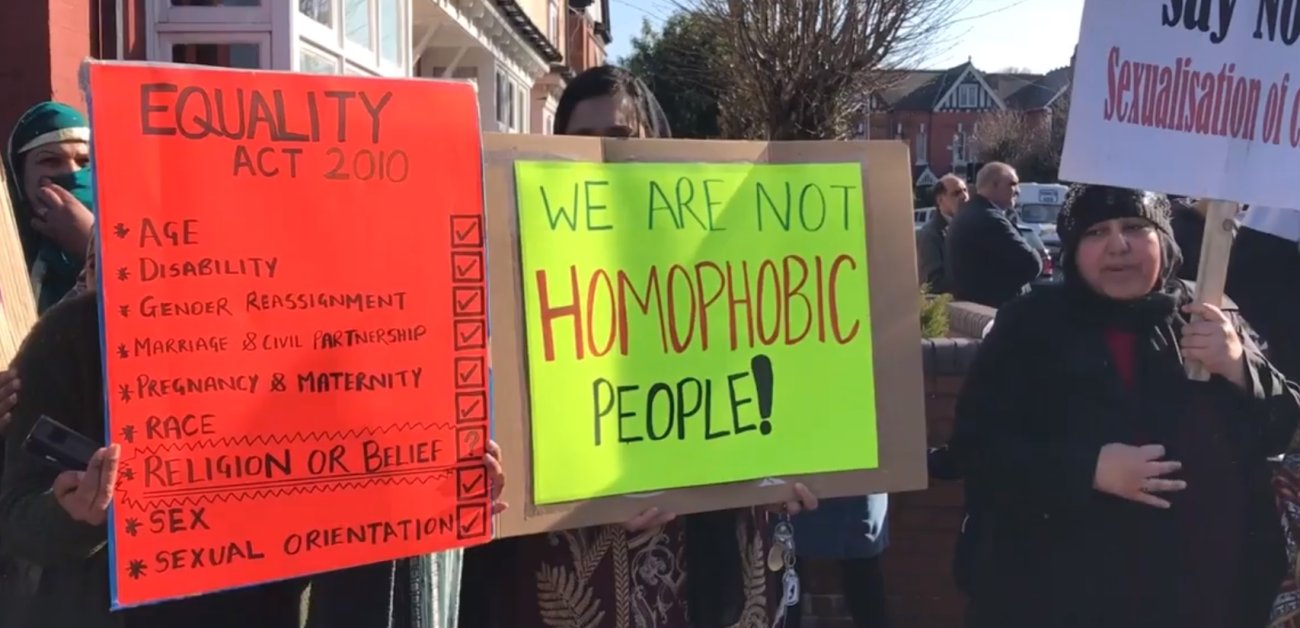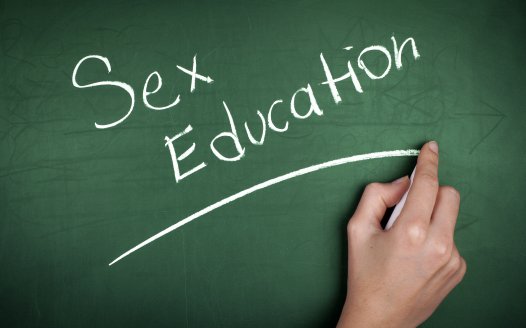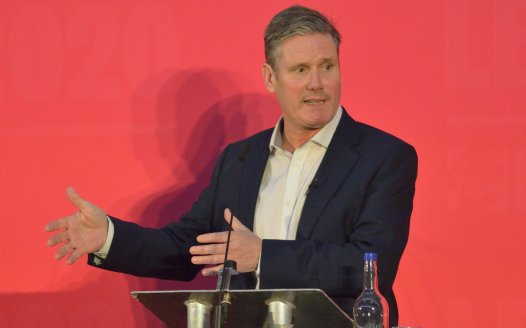NSS urges support for teachers amid anti-LGBT protests and threats
Posted: Wed, 10th Apr 2019
The National Secular Society has urged the government to reconsider a requirement on schools to take pupils' "religious background" into account when teaching about relationships amid an escalating campaign against LGBT-inclusive education.
The NSS has written to the education secretary as teachers reported being intimidated and criticised the government's response to religiously-inspired protests from parents which have spread across England.
A report in The Sunday Times this weekend said gay teachers had been targeted on social media sites and senior teachers offered police security advice.
The report added that leafleting was taking place outside schools in cities and towns including Manchester, Oldham and London. Other reports have also said opposition is being organised in Blackburn and Bradford.
Several schools have already suspended lessons in response to the protests.
This week the education secretary told the general secretary of a head teachers' union that parents do not have a veto over what is taught in schools. The NSS welcomed this statement but said the Department for Education (DfE) should make this clear in its guidance on relationships and sex education (RSE).
The government is planning to make RSE compulsory in all schools from September 2020. But its draft guidance includes a requirement for schools to take "the religious background of all pupils" into account when planning teaching.
In his letter to Damian Hinds, NSS chief executive Stephen Evans said this requirement "creates an unreasonable expectation that faith-based opposition to non-heteronormative sex and relationships may be accommodated".
"Regard for the religious backgrounds of pupils must not serve as a euphemism for restricting or diluting relationships or sex education.
"If parents continue to be told that schools must take their religious background into account, without clear limits on what this means, then reactionaries will feel emboldened to push for concessions, including the marginalisation of LGBT issues. A perceived refusal to respect 'religious backgrounds' will then feed a grievance narrative which stands to harm integration and cohesion."
Mr Evans added that if the government was not minded to remove the requirement, it "must provide clarity on this duty and the scope of required consultation".
He also asked the DfE to set out the steps it was taking to "support the wellbeing and safety of staff and pupils at schools affected by anti-RSE protests".
And he said the government's guidance "should explicitly state that heterosexual and LGBT issues are to be treated in an equally age-appropriate way".
The NSS is also urging supporters to write to their MPs to make similar points.
In response to a consultation on the introduction of compulsory RSE in November the NSS said the requirement to consider pupils' religious backgrounds was "open to abuse". The society also warned that varying "the form or content of RSE" based on pupils' religious backgrounds "may be discriminatory".
Mainly Muslim parents, with some support from those of other religions, have protested against LGBT-inclusive education in recent weeks, drawing a series of concessions in several schools.
Some religious groups have also organised opposition to the government's decision to make relationships and sex education (RSE) compulsory in all schools in England from September 2020.
Among the latest developments staff at Parkfield Community School in Birmingham, which suspended lessons in response to protests last month, have written to the education secretary to ask for support.
They warned that they were "being threatened inside and outside school" and children were coming to school "distressed" after witnessing protests and being told not to listen to staff.
The letter accused the Department for Education (DfE) of wanting to get Parkfield out of the headlines. It said teachers were "not allowed to mention LGBT" and homophobic bullying had increased at the school.
Shortly before the school suspended its lessons on diversity, members of a parents' group behind the protests reported having "a positive meeting" with DfE officials.
On Tuesday Andrew Moffat, the school's assistant head who wrote its programme on equality and diversity, said he had been given police advice about his journey to and from school.
The head teacher at another Birmingham school, Sarah Hewitt-Clarkson at Anderton Park Primary, has also been added to a fast police response scheme, according to The Sunday Times. Police are also examining a threatening letter she received.
Teaching unions have also said WhatsApp groups set up by activists and protesters to share information about the new guidance have pointed to gay teachers.
The NSS wrote to the Department for Education (DfE) last month to urge it to provide "unequivocal support" to Parkfield, Moffat and "other schools which face similar pressure".
In response the DfE said: "The department trusts head teachers and teachers to develop a curriculum and whole school approach that best ensures personal development as well as the academic development of their pupils."
It said a range of interested parties in Birmingham were "working closely together on a positive resolution that provides the best outcome for the children and consults the parents of Parkfield School pupils effectively".
It added that it was "aware of recent concerns around the No Outsiders programme" and recognised "its associated emotive impact".
Reports suggest 85 head teachers affected by the row voiced substantial criticism of DfE officials during a meeting on 29 March.
After the meeting Hewitt-Clarkson told the BBC: "Not only have central government been silent about all this, but the info they've put out is contradictory.
"Equality is non-negotiable and by not being clear, they're fudging it and not giving us their backing."
Another head said: "We feel completely alone here and feel as if we're getting no overt support whatsoever from the government. There was so much anger in the room and tears."
The national secretary of the National Association of Head Teachers (NAHT), Rob Kelsall, tweeted shortly afterwards: "DfE guidance on relationships and sex education still inadequate and open to interpretation.
"Government need to step up and sort this out. School leaders are legally bound and morally driven to teach and promote equality."
The BBC reported that the heads overwhelmingly urged the government to be clearer in its guidance on equality teaching and said it should issue a statement in support of the teachers.
In his letter to the NAHT's general secretary Paul Whiteman, Damian Hinds said: "I want to reassure you and the members you represent that consultation does not provide a parental veto on curriculum content. We want schools to consult parents, listen to their views, and make reasonable decisions about how to proceed (including through consideration of their wider duties) - and we will support them in this.
"We trust school leaders and teachers to make the right professional choices and act reasonably when considering consultation feedback, and are clear that dedicated public servants faithfully discharging their duty have an absolute right to feel confident and safe."
NSS chief executive Stephen Evans called on the government to "resist this growing attempt to undermine education about relationships and equality".
"The government says it defends teachers' ability to do their jobs in the face of unreasonable pressure. But the attempt to undermine teaching which acknowledges LGBT people's existence is a well-coordinated, rapidly spreading and deeply intimidating campaign which requires a national response.
"Leaving individual schools to face the wrath of vocal, intolerant, reactionary religious groups is not good enough. Explicitly requiring schools to respect children's religious backgrounds creates the credible impression of a fundamentalist's veto. The government must remove it, or failing that at least clarify its limits."
This week a survey of 366 teachers and parents, conducted by two academics at Leeds Beckett University, suggested there is strong public support for LGBT-inclusive teaching.
Eighty-eight per cent of respondents to the poll said parents should not have a right to withdraw children from lessons about LGBT people.
Ninety-four per cent said it was important for schools to teach children about LGBT identities. The same proportion said schools had a responsibility to promote LGBT inclusion.
Seventy-six per cent said schools should teach children about different kinds of relationships from the age of four, while 73% said same-sex marriage should be taught from that age. Fifty per cent said four-year-olds should learn about transgender identities.
In February the government reaffirmed that it would not introduce a parental right to opt children out from relationships education in primary schools from 2020. It will replace parents' right to withdraw children from sex education, at secondary school level, with a "right to request" withdrawal.
While you're here
Our news and opinion content is an important part of our campaigns work. Many articles involve a lot of research by our campaigns team. If you value this output, please consider supporting us today.









